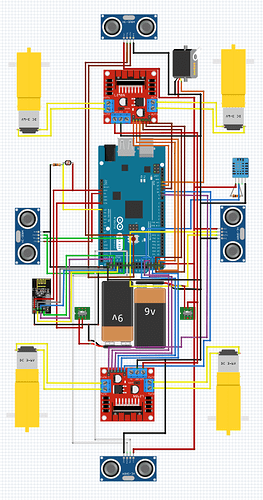This should be the relevant code:
Car.cpp:
#include <Car.h>
Car::Car() :
ultrasonicSensorFront_(ULTRASONIC_FRONT_TRIG, ULTRASONIC_FRONT_ECHO, ULTRASONIC_MAX_DISTANCE),
ultrasonicSensorBack_(ULTRASONIC_BACK_TRIG, ULTRASONIC_BACK_ECHO, ULTRASONIC_MAX_DISTANCE),
ultrasonicSensorLeft_(ULTRASONIC_LEFT_TRIG, ULTRASONIC_LEFT_ECHO, ULTRASONIC_MAX_DISTANCE),
ultrasonicSensorRight_(ULTRASONIC_RIGHT_TRIG, ULTRASONIC_RIGHT_ECHO, ULTRASONIC_MAX_DISTANCE),
camera_()
{
initMotors();
stopAllMotors();
speed = 255;
Serial.println("Car initialized");
}
void Car::initMotors(){
pinMode(MOTOR_A_EN, OUTPUT);
pinMode(MOTOR_A_IN1, OUTPUT);
pinMode(MOTOR_A_IN2, OUTPUT);
pinMode(MOTOR_B_EN, OUTPUT);
pinMode(MOTOR_B_IN1, OUTPUT);
pinMode(MOTOR_B_IN2, OUTPUT);
pinMode(MOTOR_C_EN, OUTPUT);
pinMode(MOTOR_C_IN1, OUTPUT);
pinMode(MOTOR_C_IN2, OUTPUT);
pinMode(MOTOR_D_EN, OUTPUT);
pinMode(MOTOR_D_IN1, OUTPUT);
pinMode(MOTOR_D_IN2, OUTPUT);
}
void Car::driveMotor(Motor motor, MotorDirection direction){
bool in1 = LOW;
bool in2 = LOW;
if(direction == FORWARD) {
in1 = HIGH;
in2 = LOW;
} else if (direction == REVERSE) {
in1 = LOW;
in2 = HIGH;
} //if none of the if-statements triggered, the direction is
//STOP and both pins are set to LOW as they were initialized
if(direction == STOP) {
speed = 0;
}
switch(motor){
case MOTOR_A:
analogWrite(MOTOR_A_EN, speed);
if(in1 == HIGH) { //prevents both pins from being HIGH by first writing the LOW Pin
digitalWrite(MOTOR_A_IN2, in2);
}
digitalWrite(MOTOR_A_IN1, in1);
digitalWrite(MOTOR_A_IN2, in2);
break;
case MOTOR_B:
if(in1 == HIGH) {
digitalWrite(MOTOR_B_IN2, in2);
}
analogWrite(MOTOR_B_EN, speed);
digitalWrite(MOTOR_B_IN1, in1);
digitalWrite(MOTOR_B_IN2, in2);
break;
case MOTOR_C:
if(in1 == HIGH) {
digitalWrite(MOTOR_C_IN2, in2);
}
analogWrite(MOTOR_C_EN, speed);
digitalWrite(MOTOR_C_IN1, in1);
digitalWrite(MOTOR_C_IN2, in2);
break;
case MOTOR_D:
if(in1 == HIGH) {
digitalWrite(MOTOR_D_IN2, in2);
}
analogWrite(MOTOR_D_EN, speed);
digitalWrite(MOTOR_D_IN1, in1);
digitalWrite(MOTOR_D_IN2, in2);
break;
}
}
void Car::updateMotorDirections(Joystick joystick1, Joystick joystick2){
Position joy1X = joystick1.getPositionX();
Position joy1Y = joystick1.getPositionY();
Position joy2X = joystick2.getPositionX();
Position joy2Y = joystick2.getPositionY();
MotorDirection directionAandD = FORWARD; //automatically handles state if joy2Y is TOP and joy2X is MIDDLE
MotorDirection directionBandC = FORWARD;
bool areAllJoysticksInMiddle = true;
if(joystick2.hasPositionChanged()) {
areAllJoysticksInMiddle = false;
switch(joy2Y) {
case TOP: {
if(joy2X == LEFT) {
directionAandD = STOP;
} else if(joy2X == RIGHT) {
directionBandC = STOP;
}
driveMotor(MOTOR_A, directionAandD);
driveMotor(MOTOR_B, directionBandC);
driveMotor(MOTOR_C, directionBandC);
driveMotor(MOTOR_D, directionAandD);
} break;
case MIDDLE: {
MotorDirection directionAandC = REVERSE; //automatically handles state if joy2X is LEFT
MotorDirection directionBandD = FORWARD;
if(joy2X == RIGHT) {
directionAandC = FORWARD;
directionBandD = REVERSE;
}
driveMotor(MOTOR_A, directionAandC);
driveMotor(MOTOR_B, directionBandD);
driveMotor(MOTOR_C, directionAandC);
driveMotor(MOTOR_D, directionBandD);
} break;
case BOTTOM: {
directionAandD = REVERSE; //automatically handles state if joy2X is MIDDLE
directionBandC = REVERSE;
if(joy2X == LEFT) {
directionBandC = STOP;
} else if(joy2X == RIGHT) {
directionAandD = STOP;
}
driveMotor(MOTOR_A, directionAandD);
driveMotor(MOTOR_B, directionBandC);
driveMotor(MOTOR_C, directionBandC);
driveMotor(MOTOR_D, directionAandD);
} break;
case RIGHT: //fallthrough
case LEFT:
Serial.println("ERROR: Joystick´s y-axis has a value from the x-axis");
break;
}
} else if(joystick1.hasPositionChanged()){
areAllJoysticksInMiddle = false;
if(joy1Y == MIDDLE) {
directionAandD = REVERSE; //automatically handles state if joy1X is LEFT
directionBandC = FORWARD;
if(joy1X == RIGHT) {
directionAandD = FORWARD;
directionBandC = REVERSE;
}
driveMotor(MOTOR_A, directionAandD);
driveMotor(MOTOR_B, directionBandC);
driveMotor(MOTOR_C, directionBandC);
driveMotor(MOTOR_D, directionAandD);
}
}
if(joy1Y == TOP && joy1X == MIDDLE) {
camera_.moveLeft();
} else if(joy1Y == BOTTOM && joy1X == MIDDLE) {
camera_.moveRight();
}
if(communicator_.joystick1_.isButtonDown()) {
camera_.returnToCenter();
}
if(joystick1.isInPosition(MIDDLE, MIDDLE) && joystick2.isInPosition(MIDDLE, MIDDLE) && !areAllJoysticksInMiddle) {
stopAllMotors();
areAllJoysticksInMiddle = true;
}
}
void Car::stopAllMotors(){
driveMotor(MOTOR_A, STOP);
driveMotor(MOTOR_B, STOP);
driveMotor(MOTOR_C, STOP);
driveMotor(MOTOR_D, STOP);
Serial.println("All motors stopped");
}
void Car::update(){
uint8_t* data = communicator_.getReceivedData();
communicator_.joystick1_.setPositionX(Joystick::getPositionByValue(X_Axis, *data));
communicator_.joystick1_.setPositionY(Joystick::getPositionByValue(Y_Axis, *(data + 1)));
communicator_.joystick1_.setButtonDown(*(data + 2));
communicator_.joystick2_.setPositionX(Joystick::getPositionByValue(X_Axis, *(data + 3)));
communicator_.joystick2_.setPositionY(Joystick::getPositionByValue(Y_Axis, *(data + 4)));
communicator_.joystick2_.setButtonDown(*(data + 5));
speed = map(*(data + 6), 0, 255, 100, 255);
camera_.setSpeed(*(data + 6));
if(communicator_.getSaveStopTimer() + CONNECTION_LOST_WARNING > millis()) { //check if the remote responded in the last 500 milliseconds
updateMotorDirections(communicator_.joystick1_, communicator_.joystick2_);
} else {
stopAllMotors();
Serial.println("NO DATA AVAILABLE");
}
sendSensorData();
}
Car.h:
#include <Arduino.h>
#include <Communicator.h>
#include <DHT11Sensor.h>
#include <UltrasonicSensor.h>
#include <Camera.h>
#define MOTOR_A_EN 12
#define MOTOR_A_IN1 22
#define MOTOR_A_IN2 23
#define MOTOR_B_EN 11
#define MOTOR_B_IN1 25 //A B
#define MOTOR_B_IN2 24 //
//C D
#define MOTOR_C_EN 9
#define MOTOR_C_IN1 27
#define MOTOR_C_IN2 26
#define MOTOR_D_EN 10
#define MOTOR_D_IN1 28
#define MOTOR_D_IN2 29
#define ULTRASONIC_FRONT_TRIG 38
#define ULTRASONIC_FRONT_ECHO 39
#define ULTRASONIC_BACK_TRIG 42
#define ULTRASONIC_BACK_ECHO 43
#define ULTRASONIC_LEFT_TRIG 44
#define ULTRASONIC_LEFT_ECHO 45
#define ULTRASONIC_RIGHT_TRIG 40
#define ULTRASONIC_RIGHT_ECHO 41
#define ULTRASONIC_MAX_DISTANCE 100
enum Motor {
MOTOR_A,
MOTOR_B,
MOTOR_C,
MOTOR_D
};
enum MotorDirection {
FORWARD,
REVERSE,
STOP
};
class Car {
public:
Communicator communicator_;
UltrasonicSensor ultrasonicSensorFront_;
UltrasonicSensor ultrasonicSensorBack_;
UltrasonicSensor ultrasonicSensorLeft_;
UltrasonicSensor ultrasonicSensorRight_;
DHT11Sensor dht11Sensor_;
Camera camera_;
Car();
void stopAllMotors();
void update();
private:
int speed;
void updateMotorDirections(Joystick joystick1, Joystick joystick2);
void initMotors();
void driveMotor(Motor motor, MotorDirection direction);
void sendSensorData();
};
It´s also available on github if you need more: Mechanum-Wheel-Car/Mechanum Wheel Car/src at main · CodingFactoryT/Mechanum-Wheel-Car (github.com)

